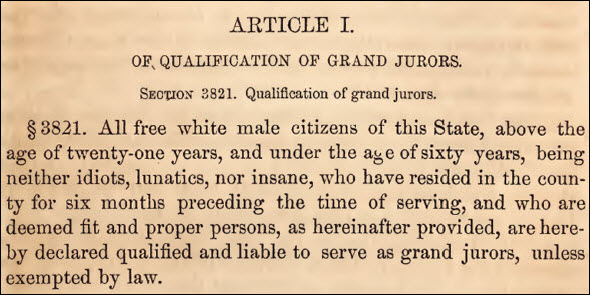Parsing the jury lists
There are 75 names on page 1.
Another 76 on page 2.
And another 20 on page 3.
John T. Callaway was 30 years old, a farmer, married, with two small children.
Reuben Kendall was a 54-year-old farmer, married for what looks like the third time, with four children living at home.
James D. Willis was a 64-year-old farmer.
Nicholas C. Ware, a 45-year-old farmer who’d later become a preacher.
William P. Bradford, a 27-year-old school teacher.
Stephen G. Pettus Sr. was a 70-year-old farmer.
Stephen G. Pettus Jr., a 36-year-old farmer.
The list goes on and on.
And although that list is now 160 years old, those of us researching in Georgia — where The Legal Genealogist will be speaking Saturday at the Augusta Genealogical Society’s Homecoming — know so very much about every one of those people whose names appear on that list.
Because that list is the Grand Jury list for the Superior Court in Wilkes County, Georgia, for 7 June 1858.1
We know which of those men could actually have served on a Grand Jury in 1858. Which would have been excused. How long they’d have had to live in Wilkes County. And that they were free white men without mental incapacities. And they had to be taxpayers.
All of which isn’t set out in the list at all. Only the 171 names are on that list, and nothing more.
But the laws of the day give us the rest, with an occasional peek at some census data.
We know from the laws that only free white male citizens between the ages of 21 and 60, resident in the county in which called, could serve as trial or grand jurors under Georgia law at the time.2
They had to be taxpayers — their names had to appear in the tax returns of the county — and they had to be “fit and proper persons to serve as grand jurors.”3
They likely weren’t ministers at the time — they could apply to be excused from jury service.4 Nor were they likely to be justices of the lower courts, who could also be exempt if they chose.5
We know they couldn’t be “an idiot, or lunatic, or intoxicated.”6
That was still the law by the Code of 1860: “All free white male citizens of this State, above the age of twenty-one years, and under the age of sixty years, being neither idiots, lunatics, nor insane, who have resided in the county for six months preceding the time of serving, and who are deemed fit and proper persons, as hereinafter provided, are hereby declared qualified and liable to serve as grand jurors, unless exempted by law.”7

And, the 1860 Code said, they had to be on the tax returns and be “such able, discreet, and qualified citizens of the county as … are fit and proper persons to serve as grand jurors…”8
Applying the law to those men, with those peeks at the census, we know some of them were too old. None were too young. Some were disqualified by occupation. All were free white men and taxpayers.
That’s quite a bit to know about people who are just names on a 160-year-old list.
And we know it because we know that, to understand the records, we have to understand the law.
SOURCES
- Grand Jurors, Record 78-528m_01622, Wilkes County Court Records, ac. 1978-0528M, Georgia Archives; digital images, Georgia’s Virtual Vault, Georgia Archives (http://vault.georgiaarchives.org/cdm/ : accessed 30 July 2018). ↩
- §§210, 237, “Juries,” in Howell Cobb, compiler, Compilation of the General and Public Statutes of the State of Georgia (New York : Edw. O. Jenkins, 1859), 79, 86; digital images, Internet Archive (https://archive.org : accessed 30 July 2018). ↩
- Ibid., §218, 82. ↩
- Ibid., §223, 83. ↩
- Ibid., §235, 85. ↩
- Ibid., §243, 86. ↩
- §3821, “Qualification of Grand Jurors,” in R.H. Clark et al., The Code of the State of Georgia (Atlanta : John H. Seals, 1861), 721; digital images, Internet Archive (https://archive.org : accessed 30 July 2018). ↩
- Ibid., §3822, 722. ↩



Because I’m anal …
Two of the names on the list were “James D. Willis … a 64-year-old farmer [and] Stephen G. Pettus Sr. … a 70-year-old farmer”
But the law said “only free white male citizens between the ages of 21 and 60 … could serve as trial or grand jurors …”
Why would 64 year old and 70 year old men appear on the jury list?
Tax lists (used to create the jury summons list) don’t show ages.
Great idea. What a wealth of information! I’ve used legal phrasing in wills (upon reaching his majority) to estimate birth order and approximate ages but I haven’t thought of looking at other laws and legal phrasing to estimate information about ancestors. Thank you.